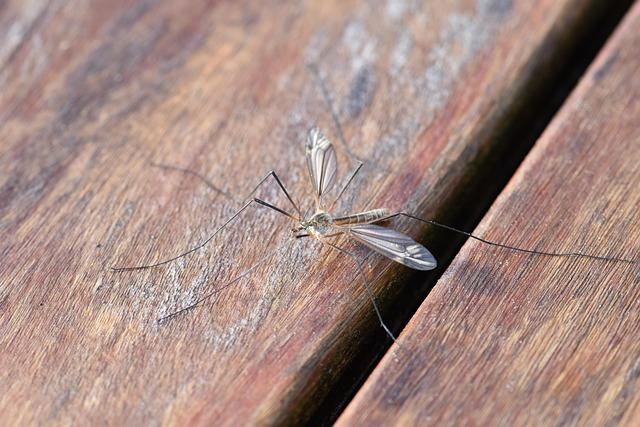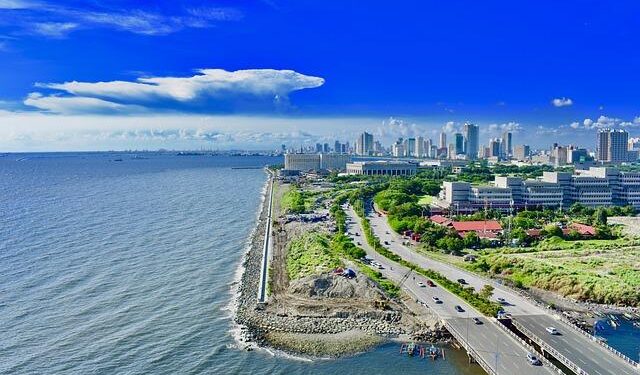As dengue fever cases continue to surge across the Philippines, local authorities in Manila are taking a novel approach to combat the mosquito population that spreads the virus. In a striking initiative aimed at reducing the number of sickening bites and protecting vulnerable communities, the town is offering a cash bounty for each mosquito collected. This unorthodox strategy reflects the urgency of the public health crisis and highlights the creative measures being employed to address the rising threat of dengue. As the Philippines grapples with the implications of this viral outbreak, the unique bounty system underscores the pressing need for effective mosquito control and community engagement in disease prevention efforts. In this article,we delve into the background of the dengue epidemic,examine the rationale behind the bounty program,and explore the broader implications for public health in the region.
Mosquito bounty Initiative in Manila: A Response to rising dengue Cases
The recent surge in dengue fever cases in Manila has prompted local authorities to take unprecedented measures. In an innovative strategy, the city has introduced a Mosquito Bounty Initiative, encouraging residents to actively participate in combating the disease-carrying insects. This program offers financial rewards to individuals who capture and submit mosquitoes, especially Aedes aegypti, known for spreading the dengue virus. By engaging the community, officials aim to reduce the mosquito population and raise awareness about preventive measures.
to further educate the public, the initiative includes various outreach activities, such as workshops and informational campaigns. Participants are trained on effective mosquito-catching techniques, the importance of maintaining clean environments, and recognizing symptoms of dengue. This community-driven approach not only fosters civic obligation but also empowers residents to play a role in public health. Below is a summary of the key components of the initiative:
| Key Components | Description |
|---|---|
| Rewards | Cash incentives for catching mosquitoes |
| Training Sessions | Workshops on mosquito identification and prevention |
| awareness campaigns | Promoting clean spaces and dengue symptoms |

Understanding the Dengue Epidemic: Causes and Consequences in the philippines
The ongoing dengue epidemic in the Philippines has prompted local governments to adopt innovative solutions to mitigate the rising case numbers. Dengue fever, transmitted primarily by the Aedes aegypti mosquito, has seen a significant uptick in instances, particularly in urban areas where water stagnation creates ideal breeding conditions. As local authorities struggle to control the spread,some towns are offering monetary incentives to citizens who can capture these disease-carrying mosquitoes. This unique approach not only seeks to engage the community in prevention efforts but also raises awareness about the importance of a clean habitat in combating vector breeding.
To fully grasp the magnitude of the crisis, consider the factors contributing to the surge in dengue cases. The following points offer insight into the epidemic’s causes and effects:
- Climate Change: Increasing temperatures and erratic rainfall patterns create favorable conditions for mosquito reproduction.
- Urbanization: Rapid urban growth has lead to insufficient waste management and water systems,exacerbating water collection.
- Public Awareness: Limited knowledge about preventive measures leaves communities vulnerable.
- Healthcare Access: Overburdened health services struggle to keep pace with rising dengue cases.
| Key Statistics | Current Year | Previous Year |
|---|---|---|
| Reported cases | 35,000+ | 25,000+ |
| Fatalities | 200+ | 100+ |
| Vaccination Coverage | 15% | 10% |

Public Health Strategies: How the Manila Town is Tackling Mosquito Breeding
In an innovative effort to combat the rising cases of dengue fever, local authorities in Manila have implemented a unique bounty program aimed at reducing mosquito populations. Residents are encouraged to collect and turn in mosquito larvae, with each submission yielding a monetary reward. This initiative not only incentivizes community participation but also raises awareness about mosquito breeding sites. The program has highlighted key breeding locations, such as:
- Stagnant water in residential areas
- Unused containers and tires
- Blocked drainage systems
- Flower pots and plant trays
To further bolster the public health initiative, educational workshops are being organized throughout the town. These workshops focus on preventative measures and the importance of eliminating breeding grounds. Residents receive training on proper waste disposal and are shown the health risks associated with standing water. Data from the local health department shows a sharp increase in dengue cases, making community involvement vital. Here’s a table summarizing the recent dengue fever statistics in Manila:
| Year | Cases Reported | Deaths |
|---|---|---|
| 2021 | 1,500 | 20 |
| 2022 | 2,200 | 35 |
| 2023 (to date) | 3,000 | 45 |

Community Engagement: The Role of Residents in the Bounty Program
Engaging the community is crucial for the success of the Bounty Program aimed at controlling the surge of dengue cases.The initiative encourages residents to take an active role in identifying and eliminating mosquito breeding grounds in their neighborhoods. This not only fosters a sense of ownership among the community members but also promotes awareness about dengue prevention. Key actions residents can take include:
- Regularly checking and cleaning areas prone to standing water.
- Reporting mosquito sightings and larvae infestations to local authorities.
- Participating in community clean-up drives organized by local government units.
- Spreading the word on prevention techniques to friends and family.
The incentive of a monetary reward for collected mosquitoes amplifies community participation, creating a collaborative atmosphere in which residents feel empowered to contribute to public health. Unified efforts in education and action can lead to a substantial decrease in mosquito populations,ultimately protecting vulnerable individuals from dengue. The program’s key benefits are:
| Benefit | Description |
|---|---|
| Increased Awareness | Educates residents about the risks of dengue and the importance of mosquito control. |
| Enhanced Collaboration | Encourages teamwork between residents and local authorities for better results. |
| Community Empowerment | Instills a sense of responsibility among residents for their health and environment. |
| Financial Incentive | Motivates residents to participate actively by offering a tangible reward. |

Preventive Measures: Recommendations for Individuals and Families
As the threat of dengue fever looms larger with rising cases, individuals and families must take proactive steps to protect themselves and their communities. Effective mosquito control starts at home, where simple adjustments can significantly reduce the likelihood of mosquito bites. Here are some essential recommendations:
- Eliminate standing water - Regularly check for areas where water collects, such as pots, containers, and old tires, and ensure they are emptied and cleaned.
- Use mosquito-repellent products – Apply repellents containing DEET or Picaridin on exposed skin before stepping outdoors, especially during peak feeding times.
- Install screens – Ensure that windows and doors have tight-fitting screens to prevent mosquitoes from entering your home.
- Wear appropriate clothing – Opt for long sleeves and pants, ideally light-colored, as these can help reduce skin exposure and make you less attractive to mosquitoes.
Communities can further bolster their defenses by coming together in collective efforts. Local initiatives can play a crucial role in fighting dengue outbreaks. Below are some strategies that neighborhoods can adopt:
| Strategy | Description |
|---|---|
| Community Clean-Up Drives | Organize regular clean-ups to eliminate trash and stagnant water sources in public spaces. |
| Awareness Campaigns | Distribute information on dengue prevention and treatment options via community newsletters and social media. |
| Integrated Pest Management | Collaborate with local health authorities to implement safe and effective mosquito control measures. |

Looking Ahead: Long-Term Solutions for Dengue Control and Mosquito Management
The ongoing rise in dengue cases in Manila has highlighted the urgent need for a multi-faceted approach to mosquito management and disease control. To combat this pressing issue, local authorities must adopt lasting practices that extend beyond short-term measures such as bounties for mosquitoes. Long-term strategies may include:
- community Education: Raising awareness about the disease transmission cycle can empower residents to take preventive measures in their own homes.
- Biological Control Agents: Implementing the introduction of natural predators or using bacteria that can specifically target mosquito larvae to reduce population growth.
- Urban Planning: Designing cities with better drainage systems and eliminating stagnant water sources where mosquitoes breed.
additionally, collaboration between government agencies, health organizations, and the community is vital for sustainable vector control. Regular monitoring and research should underpin these initiatives, ensuring strategies are data-driven and adaptable to changing circumstances. A holistic approach could incorporate:
| Strategy | Description |
|---|---|
| Insecticide Residual Spraying | Periodic spraying to reduce adult mosquito populations in high-risk areas. |
| genetic Modification | Releasing genetically modified mosquitoes that can reduce overall population numbers through reduced fertility. |
| Community Engagement | Encouraging local involvement in cleanup drives and prevention activities. |
Future Outlook
As the threat of dengue fever looms large in Manila, local authorities are taking innovative steps to combat the rising incidence of this debilitating disease. By launching a bounty program for mosquitoes, manila’s initiatives not only aim to curb the breeding of these pests but also engage the community in a proactive fight against dengue. This unique strategy highlights the importance of collaboration between citizens and local government in public health efforts. As the situation continues to evolve, it remains crucial for residents to stay informed about preventive measures and participate in community-driven initiatives. While the bounty on mosquitoes may serve as a temporary solution, it underscores a larger need for ongoing education and resource allocation to protect public health and ensure a safer environment for all Filipinos. As Manila navigates this public health challenge, the eyes of the world will be watching, eager to see the outcomes of these preventative measures and the resilience of a community facing such significant adversity.













Brothers in Arms: Macron, Merz, and Starmer Join Forces to Forge a New Era Beyond the U.S